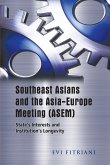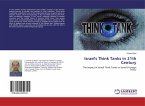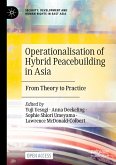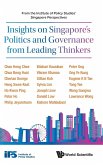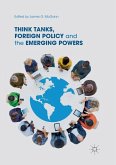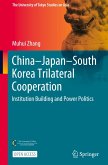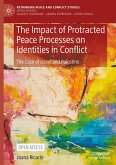Can Asians Think of Peace?
Essays on Managing Conflict in the Asian Century
Herausgegeben:Mahbubani, Kishore; Chandra, Varigonda Kesava; Tang, Kristen
Can Asians Think of Peace?
Essays on Managing Conflict in the Asian Century
Herausgegeben:Mahbubani, Kishore; Chandra, Varigonda Kesava; Tang, Kristen
- Gebundenes Buch
- Merkliste
- Auf die Merkliste
- Bewerten Bewerten
- Teilen
- Produkt teilen
- Produkterinnerung
- Produkterinnerung
This open access book explores the shifting dynamics of global power, highlighting Asia's resurgence. For centuries before the Western colonial era, China and India dominated the world economy. Now, Asia is reclaiming its historical prominence. China presents a formidable challenge to American power, while India is on track to become the world's third-largest economy by 2030. The 21st century is poised to be the Asian century, but will this rise be peaceful, or will it lead to catastrophic conflicts?
Kishore Mahbubani, head and founder of the Asian Peace Programme (APP) at the National…mehr
Andere Kunden interessierten sich auch für
![Southeast Asians and the Asia-Europe Meeting (ASEM) Southeast Asians and the Asia-Europe Meeting (ASEM)]() Evi FitrianiSoutheast Asians and the Asia-Europe Meeting (ASEM)32,99 €
Evi FitrianiSoutheast Asians and the Asia-Europe Meeting (ASEM)32,99 €![Israel's Think Tanks in 21th Century Israel's Think Tanks in 21th Century]() Ehsan EjaziIsrael's Think Tanks in 21th Century22,99 €
Ehsan EjaziIsrael's Think Tanks in 21th Century22,99 €![Operationalisation of Hybrid Peacebuilding in Asia Operationalisation of Hybrid Peacebuilding in Asia]() Operationalisation of Hybrid Peacebuilding in Asia31,99 €
Operationalisation of Hybrid Peacebuilding in Asia31,99 €![INSIGHTS ON SINGAPORE'S POLITICS & GOVERNANCE FR LEAD THINK INSIGHTS ON SINGAPORE'S POLITICS & GOVERNANCE FR LEAD THINK]() Studies Institute Of PolicyINSIGHTS ON SINGAPORE'S POLITICS & GOVERNANCE FR LEAD THINK51,99 €
Studies Institute Of PolicyINSIGHTS ON SINGAPORE'S POLITICS & GOVERNANCE FR LEAD THINK51,99 €![Think Tanks, Foreign Policy and the Emerging Powers Think Tanks, Foreign Policy and the Emerging Powers]() Think Tanks, Foreign Policy and the Emerging Powers38,99 €
Think Tanks, Foreign Policy and the Emerging Powers38,99 €![China-Japan-South Korea Trilateral Cooperation China-Japan-South Korea Trilateral Cooperation]() Muhui ZhangChina-Japan-South Korea Trilateral Cooperation38,99 €
Muhui ZhangChina-Japan-South Korea Trilateral Cooperation38,99 €![The Impact of Protracted Peace Processes on Identities in Conflict The Impact of Protracted Peace Processes on Identities in Conflict]() Joana RicarteThe Impact of Protracted Peace Processes on Identities in Conflict38,99 €
Joana RicarteThe Impact of Protracted Peace Processes on Identities in Conflict38,99 €-
-
-
This open access book explores the shifting dynamics of global power, highlighting Asia's resurgence. For centuries before the Western colonial era, China and India dominated the world economy. Now, Asia is reclaiming its historical prominence. China presents a formidable challenge to American power, while India is on track to become the world's third-largest economy by 2030. The 21st century is poised to be the Asian century, but will this rise be peaceful, or will it lead to catastrophic conflicts?
Kishore Mahbubani, head and founder of the Asian Peace Programme (APP) at the National University of Singapore, offers a collection of 61 essays on peace in Asia, co-edited by Dr. Varigonda Kesava Chandra, and Kristen Tang. Written by scholars and practitioners from both Asia and the West between July 2020 and December 2024, these essays analyze potential flashpoints in Asia and propose pragmatic, implementable ideas for conflict management and peacebuilding. Topics include managing the US-China relationship, stabilizing India-Pakistan and China-India border conflicts, strengthening relations among Southeast Asian countries, and addressing global threats such as nuclear war and climate change. Mr. Mahbubani also provides a sharp introduction, contextualizing the conflict management and peacebuilding processes of the Asian 21st century.
Kishore Mahbubani, head and founder of the Asian Peace Programme (APP) at the National University of Singapore, offers a collection of 61 essays on peace in Asia, co-edited by Dr. Varigonda Kesava Chandra, and Kristen Tang. Written by scholars and practitioners from both Asia and the West between July 2020 and December 2024, these essays analyze potential flashpoints in Asia and propose pragmatic, implementable ideas for conflict management and peacebuilding. Topics include managing the US-China relationship, stabilizing India-Pakistan and China-India border conflicts, strengthening relations among Southeast Asian countries, and addressing global threats such as nuclear war and climate change. Mr. Mahbubani also provides a sharp introduction, contextualizing the conflict management and peacebuilding processes of the Asian 21st century.
Produktdetails
- Produktdetails
- Verlag: Asia Research Institute / Springer / Springer Nature Singapore / Springer, Berlin
- Artikelnr. des Verlages: 978-981-96-5665-3
- Seitenzahl: 288
- Erscheinungstermin: 13. Juli 2025
- Englisch
- Abmessung: 241mm x 160mm x 22mm
- Gewicht: 598g
- ISBN-13: 9789819656653
- ISBN-10: 9819656656
- Artikelnr.: 73633765
- Herstellerkennzeichnung
- Springer-Verlag KG
- Sachsenplatz 4-6
- 1201 Wien, AT
- ProductSafety@springernature.com
- Verlag: Asia Research Institute / Springer / Springer Nature Singapore / Springer, Berlin
- Artikelnr. des Verlages: 978-981-96-5665-3
- Seitenzahl: 288
- Erscheinungstermin: 13. Juli 2025
- Englisch
- Abmessung: 241mm x 160mm x 22mm
- Gewicht: 598g
- ISBN-13: 9789819656653
- ISBN-10: 9819656656
- Artikelnr.: 73633765
- Herstellerkennzeichnung
- Springer-Verlag KG
- Sachsenplatz 4-6
- 1201 Wien, AT
- ProductSafety@springernature.com
Kishore Mahbubani is the head and founder of the Asian Peace Programme (APP), which is housed in the Asia Research Institute (ARI) at the National University of Singapore. He is also a Distinguished Fellow at ARI. Following a 33-year diplomatic career which included two stints as the President of the UN Security Council (Jan 2001, May 2002), Mr Mahbubani served as the Founding Dean of the Lee Kuan Yew School of Public Policy from 2004 to 2017. He is the author of ten books, including The Asian 21st Century, an open-access volume which has received millions of downloads since it was published in 2022. His articles on the rise of Asia, geopolitics and global governance have been widely published in leading publications like Financial Times, Foreign Affairs, and Foreign Policy , earning him global recognition as “the muse of the Asian century.” He was inducted into the American Academy of Arts and Sciences in 2019. Varigonda Kesava Chandra is Administrative Director of APP and Research Fellow at ARI. His research focusses on social movements, state policy and state-society relations in India, as well as Asian geopolitics. His work has been published as a monograph and in several academic journals. Kristen Tang Tse Mei is a Research Associate at ARI and has been part of the APP team since 2022. Her research focusses on Asian and global politics, public policy, and governance.
Introduction.- Part 1: Asian ideas for peace and conflict amelioration.- Can Asians speak truth to power?.- Nuclear Deterrence 3.0.- Asia, say no to NATO.- Freeze, talk and trade.- Technocratic deliberation and Asian peace.- America needs an economic peace strategy for Asia.- Where are the peacemakers?:.- Investing in peace for Asia.- Muslim Asia and the quest for peace.- Doubts about AUKUS.- Cyclone Mocha in conflict-ridden Myanmar is another warning to take climate change seriously.- Crisis management in Asia: A middle power imperative.- Rabindranath Tagore: A man for a new Asian future.- Asia should take the lead on global health.- Reconceptualizing Asia's security challenges: by Jean Dong, April 21, 2024.- A new 'coalition of the unwilling'.- Asia's middle powers' activism a plus for regional stability.- Nuclear stability in the 21st century.- Part 2: Managing the US-China contest.- How China and US can avoid a clash in the South China Sea.- Beware of Munich.- The Anchorage meeting will buy America needed time.- Navigating troubled waters: Ideas for managing tensions in the Taiwan Strait.- It s dangerous salami slicing on the Taiwan issue.- US-China trade and investment cooperation amid great power rivalry.- Averting the grandest collision of all time.- China, America and the Saudi-Iranian normalization.- Coexistence: The only realist path to peace.- America can t stop China s rise.- Biden-Xi Summit: A positive step in managing complex US-China ties.- The US and China can lead the way on nuclear threat reduction.- Part 3: Conflict management in South Asia.- China and India: A new diplomacy.- Can South Asia put India-Pakistan hostilities behind to unite for greater good?.- An India-Pakistan ceasefire that can stick.- China and India: More new diplomacy.- Safer together: Why South and Southeast Asia must cooperate to prevent a new Cold War in Asia.- India-Pakistan: Peace by pieces.- India-China relations: Going beyond the military stalemate.- Restoring trust between China and India: A modest suggestion.- India can still be a bridge to the Global South.- Would you care for a 'package deal'? The future of a territorial swap on the disputed Sino-Indian boundary.- Why India-Pakistan relations need a new era of engagement.- Why have China and India come together?.- Part 4: Conflict management in Southeast and East Asia.- China and Japan: Will they ever reconcile?.- Islamist terrorism in Indonesia: Roots and responses.- The Biden era: Challenges and opportunities for Southeast Asia.- The oxygen of Asean.- An antidote against narrow nationalism? Why regional history matters.- Can Biden bring peace to Southeast Asia?.- Countering the threat of Islamist extremism in Southeast Asia.- HADR as a diplomatic tool in Southeast Asia-China relations amid changing security dynamics.- Can the Belt and Road Initiative bring peace to China and Asean.- Countering Moro youth extremism in the Philippines.- The EU and ASEAN: Partners to manage great power rivalry.- Caught in the middle? Not necessarily. Non-alignment could help Southeast Asian regional integration.- Managing expectations: Indonesia navigating its international roles.- US-China rivalry will be a stern test for Vietnam s diplomatic juggle.- Civilisational futures and the role of Southeast Asia.- The US, China, and the Philippines in between.- Singapore s role as a neutral interpreter of China to the West.- Securing China-US relations within the wider Asia-Pacific.- Southeast Asia, China, and the Belt and Read Initiative: still going strong?.- How Malaysia can boost Asean agency and centrality amid global challenges.
Introduction.- Part 1: Asian ideas for peace and conflict amelioration.- Can Asians speak truth to power?.- Nuclear Deterrence 3.0.- Asia, say no to NATO.- Freeze, talk and trade.- Technocratic deliberation and Asian peace.- America needs an economic peace strategy for Asia.- Where are the peacemakers?:.- Investing in peace for Asia.- Muslim Asia and the quest for peace.- Doubts about AUKUS.- Cyclone Mocha in conflict-ridden Myanmar is another warning to take climate change seriously.- Crisis management in Asia: A middle power imperative.- Rabindranath Tagore: A man for a new Asian future.- Asia should take the lead on global health.- Reconceptualizing Asia's security challenges: by Jean Dong, April 21, 2024.- A new 'coalition of the unwilling'.- Asia's middle powers' activism a plus for regional stability.- Nuclear stability in the 21st century.- Part 2: Managing the US-China contest.- How China and US can avoid a clash in the South China Sea.- Beware of Munich.- The Anchorage meeting will buy America needed time.- Navigating troubled waters: Ideas for managing tensions in the Taiwan Strait.- It s dangerous salami slicing on the Taiwan issue.- US-China trade and investment cooperation amid great power rivalry.- Averting the grandest collision of all time.- China, America and the Saudi-Iranian normalization.- Coexistence: The only realist path to peace.- America can t stop China s rise.- Biden-Xi Summit: A positive step in managing complex US-China ties.- The US and China can lead the way on nuclear threat reduction.- Part 3: Conflict management in South Asia.- China and India: A new diplomacy.- Can South Asia put India-Pakistan hostilities behind to unite for greater good?.- An India-Pakistan ceasefire that can stick.- China and India: More new diplomacy.- Safer together: Why South and Southeast Asia must cooperate to prevent a new Cold War in Asia.- India-Pakistan: Peace by pieces.- India-China relations: Going beyond the military stalemate.- Restoring trust between China and India: A modest suggestion.- India can still be a bridge to the Global South.- Would you care for a 'package deal'? The future of a territorial swap on the disputed Sino-Indian boundary.- Why India-Pakistan relations need a new era of engagement.- Why have China and India come together?.- Part 4: Conflict management in Southeast and East Asia.- China and Japan: Will they ever reconcile?.- Islamist terrorism in Indonesia: Roots and responses.- The Biden era: Challenges and opportunities for Southeast Asia.- The oxygen of Asean.- An antidote against narrow nationalism? Why regional history matters.- Can Biden bring peace to Southeast Asia?.- Countering the threat of Islamist extremism in Southeast Asia.- HADR as a diplomatic tool in Southeast Asia-China relations amid changing security dynamics.- Can the Belt and Road Initiative bring peace to China and Asean.- Countering Moro youth extremism in the Philippines.- The EU and ASEAN: Partners to manage great power rivalry.- Caught in the middle? Not necessarily. Non-alignment could help Southeast Asian regional integration.- Managing expectations: Indonesia navigating its international roles.- US-China rivalry will be a stern test for Vietnam s diplomatic juggle.- Civilisational futures and the role of Southeast Asia.- The US, China, and the Philippines in between.- Singapore s role as a neutral interpreter of China to the West.- Securing China-US relations within the wider Asia-Pacific.- Southeast Asia, China, and the Belt and Read Initiative: still going strong?.- How Malaysia can boost Asean agency and centrality amid global challenges.


